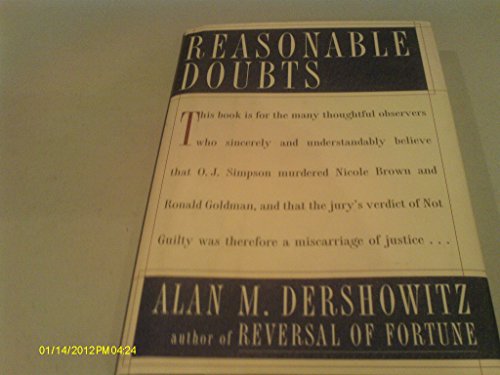Synopsis
Using the O.J. Simpson case as a backdrop, the famous defense lawyer examines the American criminal justice system, analyzing its strengths and weaknesses
Reviews
Despite the hoopla surrounding the Simpson trial book deals, this is a solid piece of reflection and argument by Dershowitz (Reversal of Fortune), who was chosen to prepare the appeal had Simpson been convicted. Dershowitz believes that Simpson lawyer Robert Shapiro, not the flamboyant orator Johnnie Cochran, was the most crucial to the defense, because Shapiro hired top forensic experts to challenge the prosecution and insisted on a preliminary hearing (not a closed grand jury) to evaluate the prosecution's case. He also suggests that the verdict "is a wake-up call about police perjury"; some jurors might have concluded that the police tried to frame a murderer; the jury and the public saw very different pictures of Simpson's history of spouse abuse; Judge Ito's exclusion of most of the Fuhrman tapes would have highlighted on appeal. The media circus, Dershowitz warns, took place outside the courtroom; the issue is not cameras in the court but whether we should restrict media coverage of trials, as in Canada. While Dershowitz lapses into score-settling with his critics and sniping about Marcia Clark's hyperbole, he makes a strong case against conventional perceptions of the trial. Author tour.
Copyright 1996 Reed Business Information, Inc.
No one who followed the Simpson case should miss Alan Dershowitz's intriguing explanation of the verdict. No matter what your opinion, read this important page turner.
Here is the first word, though certainly not the last, from a lawyer involved in the O. J. Simpson case. Dershowitz, whose job was to handle the appeal for the case should it have been necessary, is also one of the foremost (and most prolific) writers about the American legal system. He states in his introduction that this book was not written to change anyone's mind, but rather to explain how, under our criminal justice system, the jury could have properly reached a verdict that millions of people found untenable. Still, one can't help but believe that budging public opinion was a teeny part of Dershowitz's agenda. And despite his claim that he wants primarily to look at the larger issues that surround the case, Dershowitz is not shy about explaining the strengths of the defense case, while dismissing prosecution evidence and theories, often a bit too quickly; in particular, he leaves unanswered many questions about blood evidence and DNA. Dershowitz also shares his disparaging mail (much of it from fellow Jews) and goes after Marcia Clark, who, he claims, supported Detective Fuhrman even after she knew about his racism. No matter what side of the verdict readers come out on, they will find plenty of provocative stuff in these pages. Just when you wanted to forget about the Simpson case, Dershowitz brings up all sorts of new issues to ponder. Ilene Cooper
"About this title" may belong to another edition of this title.
